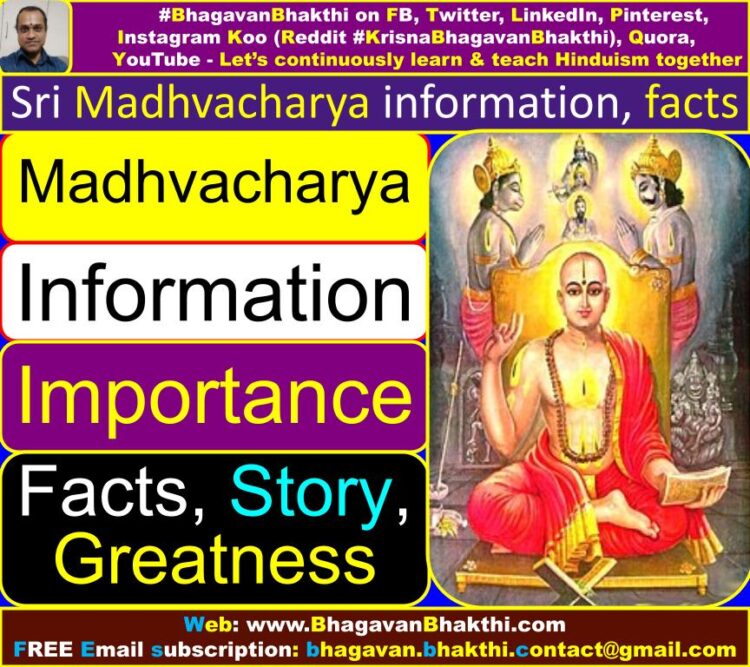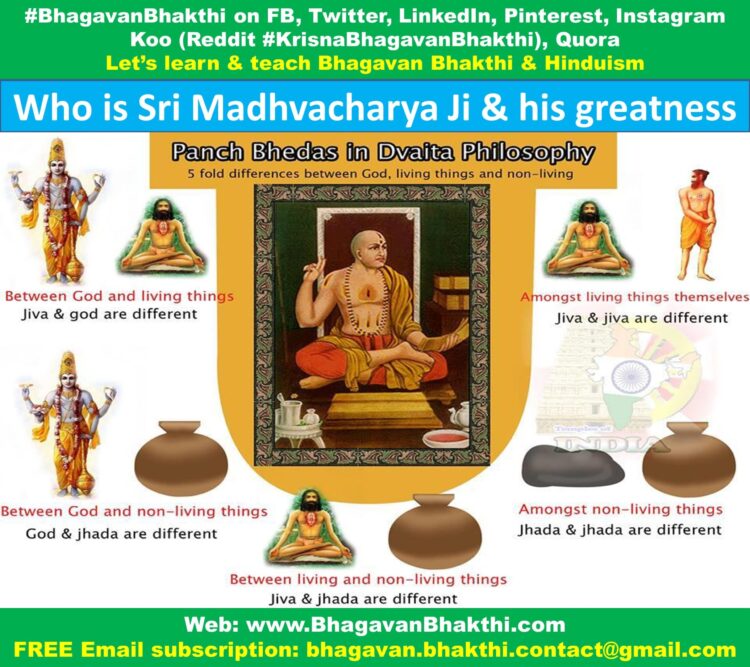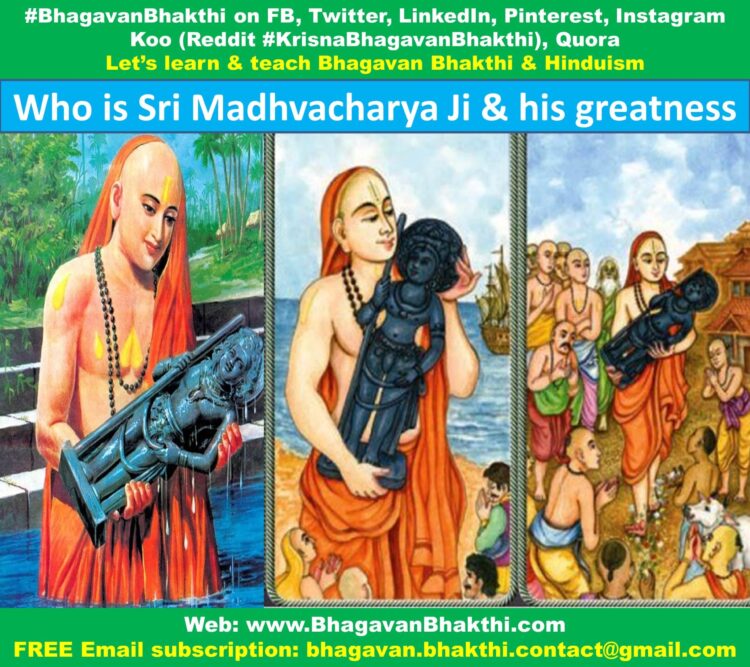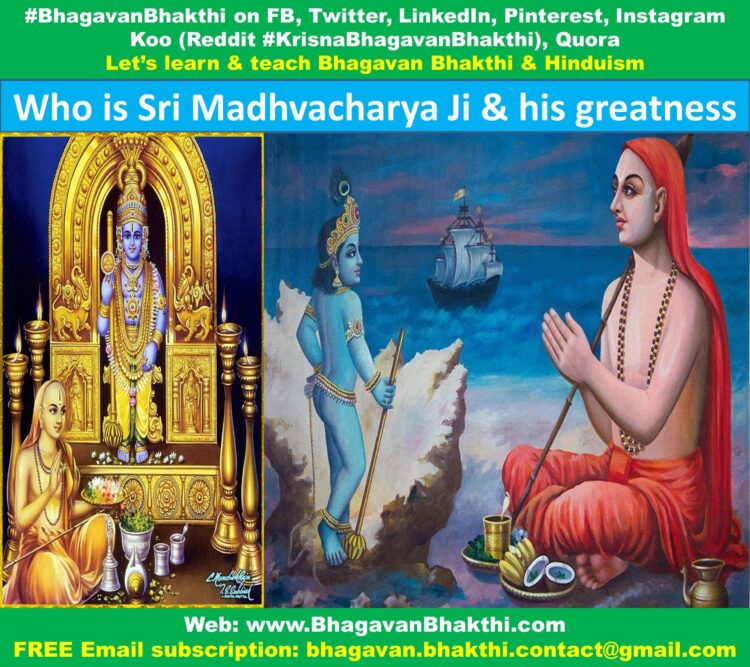Sri Madhvacharya information, facts, greatness, importance, story
Namaste friends, how are you doing today? Welcome to #BhagavanBhakthi website / blog.
Bhagavan Lord Sri Vishnu (Krishna) (Rama) and Sri Madhvacharya Ji blessings to you and your family!
In this website / blog, you will always learn about #Hinduism #Sanskrit language.
Also subscribe to my YouTube channel from this link #BhagavanBhakthi to view videos about #Hinduism #Sanskrit language.
Just before going to “Sri Madhvacharya information, facts, greatness, importance, story“, let us have some brief information.

Sri Madhvacharya birth year is : 1238 A.D.
Sri Madhvacharya death year : He never died. As per ‘Sri Madhvavijaya’, even today he is staying in Badrikashrama (Badrinath) and serving Lord Sri Vishnu’s two avatars, that is, Lord Srimann Narayana and Lord (Sage) Sri Vedavyasa.
Sri Madhvacharya birth name is : Vasudeva (वासुदेव) (vāsudēva).
Sri Madhvacharya parents names are : Naduillaya or Madhyageha Bhatta (Father) and Satyavati or Vedavati (Mother).
Sri Madhvacharya siblings names are : Sri Vishnu Tirtha (brother) and Kalyani Devi (sister).
Sri Madhvacharya philosophy name is called as : Tattvavada (तत्त्ववाद) (tattvavāda) also called as द्वैत वेदान्त (dvaita vēdānta) or Dvaita Siddhanta (द्वैत सिद्धान्त) (dvaita siddānta).
Sri Madhacharya’s granthas’ (texts) (literary works) names are called as : Sarvamoola Granthas (सर्वमूल ग्रन्थ) (sarvamūla grantha).
Sri Madhvacharji different names are : Vasudeva (वासुदेव) (vāsudēva) (Before the acceptance of Sanyasa), Purnaprajnya (पूर्ण-प्रज्ञ) (pūrṇa-prajña),
Ananda Tirtha (आनन्द तीर्थ) (ānanda tīrtha), Anumana Tirtha (अनुमान तीर्थ) (anumāna tīrtha), Samsthapanacharya (संस्थापनचार्य) (sansthāpanācārya) and others.
Sri Madhvacharya is the founder of : Sri Udupi Krishna Matha.
Sri Madhvacharya is the re-founder of : Dvaita Siddhanta (Duality) (All are unique as per their qualities). (Originally Lord Sri Vishnu is the founder of Dvaita Siddhanta.)
Sri Madhvacharya birth place is : Pajaka (पाजक) (pājaka), near today’s Udupi, Karnataka.
Sri Madhvacharya Guru name is : Sri Achyutaprekshacharya (श्री अच्युतप्रेक्षचार्य) (śrī acyutaprēkṣācārya).
[Note : Sri Vishnu Tirtha (brother) name was given by Sri Madhvacharya Ji after Sri Vishnu Tirtha Ji accepted the Sanyasa Ashrama. The original name is unknown.]
[Note : These parents and siblings names are not the original names of father, mother, brother and sister of Sri Madhwacharya Ji.]
[This was done as the author of ‘Sri Madhvavijaya‘ (a biography of Sri Madhvacharya Ji), that is,
Sri Narayana Panditacharya Ji don’t want to provide the correct names to avoid any family related conflicts in the future.]
[In Sanskrit, Madhyageha means a place in the center of the town or city or any place.]
[Since Sri Madhwacharya Ji’s parents were living in the center of the town, and thus father is called by an sub-name Madhyagena and not by the original name.]
[Even the mother’s name is not given correctly in the ‘Sri Madhvavijaya’ (Biography of Sri Madhvacharya Ji).]
Sri Madhvacharya (Sanskrit: मध्वाचार्य), also known as ‘Pūrna Prajña’ [Knower of everything only after Lord Sri Hari (Vishnu) and Goddess Sri Lakshmi Devi.]
Sri Madhvacharya also called as Ānanda Tīrtha (Most happiest after Lord Sri Hari / Vishnu and Goddess Sri Lakshmi Devi) –
is an Indian philosopher, theologian and is the chief proponent of the Dvaita Siddhanta (All are unique) school of Vedanta.
Sri Madhvacharya Ji called his philosophy as ‘Tattvavāda‘ (All depends on truth and arguments as per the realistic / Vedas viewpoint).
Before accepting the Sanyasa, Sri Madhvacharya ji was known as ‘Vasudeva‘ (Read as Vaasudeva and not as Vasudeva). He was born in a place called Pajaka near Udupi in Karnataka.
Sri Madhvacharya Ji’s Guru name is called as Achyuta-prekshacharya Ji.
Sri Madhwacharya Ji is the only divine person who always believes in ‘Monotheism’ (there is only one God), that is –
Lord Sri Vishnu is the only God and all others are his followers, this means –
all others are called as ‘Devatas’ (Demigods) starting from Goddess Sri Lakshmi Devi, Lord Sri Brahma Deva, Goddess Sri Sarasvati Devi,
Lord Sri Rudra Deva (Lord Shiva), Goddess Sri Parvati Devi, Lord Sri Indra Deva, Lord Sri Kama Deva, Lord Sri Surya Deva, Lord Sri Chandra Deva, etc. etc. etc.

Let us consider one shloka (sloka) (hymn) as given below:
प्रथमो हनुमान् नाम द्वितीयो भीम एव च |
पूर्णप्रज्ञ स्त्रुतियस्तु भगवद् कार्य साधकः ||
prathamO hanumAn nAma dviteeyO bheema Eva cha |
pUrNaprajna tRuteEyastu bhagavat kAryasAdhakah ||
ಪ್ರಥಮೋ ಹನೂಮನ್ನಾಮ ದ್ವಿತೀಯೋ ಭೀಮ ಏವ ಚ |
ಪೂರ್ಣಪ್ರಜ್ಞಸ್ತೃತೀಯಸ್ತು ಭಗವತ್ಕಾರ್ಯಸಾಧಕಃ ||
Meaning of this shloka (hymn) : In his first appearance he took the avatar of Hanuman in Treta Yuga, and served Lord Sri Rama.
In his second appearance as he took the avatar of Bhimasena (Bhima), in Dwapara he carried out the orders of Lord Sri Krishna.
Similarly, in his third appearance (avatar) as Srimann Madhvacharya Ji (Also called as Sri Poornapragna Ji or Sri Anandateertha Ji),
Sri Madhvacharya Ji reiterated the voice of Lord (Sage) Sri Vyasadeva [Lord (Sage) Sri Veda Vyasa Ji – An avatar of Bhagavan Sri Vishnu)
and became the greatest spiritual benefactor of mankind by preaching the Divine Dictum of ‘Dvaita Siddhanta’.
Sri Madhvacharya Ji, a man of powerful physique who could digest a cup boiled horse gram as toddler when mistakenly fed by his sister (around 5 – 6 years of age).
This is definitely the characteristics of the highly powerful Lord Sri Hanuman and Sri Bhimasena (Bhima) , the avatars of Lord Sri Vayu Deva (Sri Mukhya Prana Deva) without a second question.
Sri Madhvacharya Ji, a mountain trekker who met the eternal Guru and Lord (Sage) Sri Vedavyasa twice in Badarikashrama (Badrinath).
Sri Madhvacharya Ji done this, to receive the initiation from Lord (Sage) Sri Vedavyasa and the second time to present his version of commentary on ‘Brahma Sutras’, called as ‘Brahma Sutra Bhasya‘.
The Samstapanacharya (founder Guru) of Tattvavada or the Dvaitamata. He is Sriman Madhvacharya Ji.
Sriman Madhvacharya Ji proclaimed that the existence of Absolute cannot be proved instead it can be experienced by the seeker if he studies the scriptures (Hindu Texts).
This view was to make it clear to those who were ideologically dissatisfied with trends within Hinduism during his time.
This led him to propose an unique stream of Vedanta which contained in it an unique enchanting sparks of interpretation.

Sriman Madhvacharya Ji emphasized that one can experience the Bhagavan (God) (Lord Sri Vishnu) with either any of the three ways of knowing namely:
Pratyaksha (Perception), Pramana (Inference) or Shabda (Verbal testimony).
About seven hundred years ago this land was ruled by the first king of Khilji dynasty, Jalaluddin Firuz Khilji.
He placed his large army along the bed of River Ganga to guard the kingdom.
He would not allow anyone to cross the river as he suspected spies from the neighboring kingdom entering his province.
On the other side of the river, stood Sriman Madhvacharya Ji with his followers.
When the disciples were worried as to how to cross the river?
Sriman Madhvacharya Ji gently told them:
“Don’t panic we are here to cross the ocean of Samsara (Sansar), can’t we cross this river?
Just follow me into the waters without fear He will take us to the other side.”
Suspecting the men who were crossing the river to be emissaries, the commander ordered his men to capture them and produced them before the King.
King questioned Sriman Madhvacharya Ji through his interpreter, “Though my guards are keeping strict vigil on the river who helped you people to cross this river?”
To the astonishment of the King, Sriman Madhvacharya Ji answered in Persian language. Raising his finger towards the sky he spoke:
“The Supreme Bhagavan, who protects you, me and everyone has brought me here along with my followers.”
“For you, He is Allah; for me, He is Lord Sri Hari (Vishnu), you and me may address Him by different names, but only one will answer us both.”

The King was extremely impressed by the bold personality with so much of self-conviction.
He climbed down from his seat and invited him to the royal court.
The Acharya addressing the court said thus, “Let’s not make a fuss about how we address Him. We can address Him in any language and by any name.”
“Know that there is no word in the entire world’s vocabulary which does not relate to Him. Let go the language we speak, the entire nature admires Him.”
“The sound produced by the waves in the sea, blowing wind, chirping birds, howl of animals is nothing but a tribute to Him.”
“Learn to recognize His existence in every sound that emanates as its roots is in OM and experience Him in it.”
The entire court was stunned by the words of Sriman Madhvacharya Ji and could feel the truth in those words.
This is just one or few examples given above. The Greatness of Sriman Madhvacharya Ji is unlimited.
To learn more of his Greatnesses, you can read the “Sri Madhva Vijaya” written by Sri Narayana Panditacharya Ji.
List of Sri Madhvacharya granthas (texts) (Sarvamoola) names are as given below:
1. Srimad Bhagavad Gita Bhashyam – ಶ್ರೀಮದ್ ಭಗವದ್ಗೀತ ಭಾಷ್ಯಂ – श्रीमद् भगवद्गीत भाष्यं – śrīmad bhagavadgīta bhāṣyaṁ (About Srimad Bhagavad Gita)
2. Srimad Bhagavad Gita Tatparya Nirnaya – ಶ್ರೀಮದ್ ಭಗವದ್ಗೀತ ತಾತ್ಪರ್ಯ ನಿರ್ಣಯ – श्रीमद् भगवद्गीत तात्पर्य निर्णय – śrīmad bhagavadgīta tātparya nirṇaya (About Srimad Bhagavad Gita)
3. Srimad Brahmasutra Bhashyam – ಶ್ರೀಮದ್ ಬ್ರಹ್ಮಸೂತ್ರ ಭಾಷ್ಯಂ – श्रीमद् ब्रह्मसूत्र भाष्यं – śrīmad brahmasūtra bhāṣyaṁ (About Sutra Prasthana)
4. Srimad Brahmasutra Anuvyakhyana – ಶ್ರೀಮದ್ ಬ್ರಹ್ಮಸೂತ್ರ ಅನುವ್ಯಾಖ್ಯಾನ – श्रीमद् ब्रह्मसूत्र अनुव्याख्यान – śrīmad brahmasūtra anuvyākhyāna (About Sutra Prashthana)
5. Srimad Brahmasutra Anubhashyam – ಶ್ರೀಮದ್ ಬ್ರಹ್ಮಸೂತ್ರ ಅನುಭಾಷ್ಯಂ – श्रीमद् ब्रह्मसूत्र अनुभाष्यं – śrīmad brahmasūtra anubhāṣyaṁ (About Sutra Prasthana)
6. Srimad Brahmasutra Nyaya Vivaranam – ಶ್ರೀಮದ್ ಬ್ರಹ್ಮಸೂತ್ರ ನ್ಯಾಯ ವಿವರಣಂ – श्रीमद् ब्रह्मसूत्र न्याय विवरणं – śrīmad brahmasūtra n’yāya vivaraṇaṁ (About Sutra Prasthana)
7. Aitareya Upanishad Bhashyam – ಐತರೇಯ ಉಪನಿಷದ್ ಭಾಷ್ಯಂ – ऐतरेय उपनिषद् भाष्यं – aitarēya upaniṣad bhāṣyaṁ (About Upanishad Prasthana)
8. Chandogya Upanishad Bhashyam – ಛಾಂದೋಗ್ಯ ಉಪನಿಷದ್ ಭಾಷ್ಯಂ – छांदोग्य उपनिषद् भाष्यं – chāndōgya upaniṣad bhāṣyaṁ (About Upanishad Prasthana)
9. Brihadaranyaka Upanishad Bhashyam – ಬೃಹದಾರಣ್ಯಕ ಉಪನಿಷದ್ ಭಾಷ್ಯಂ – बृहदारण्यक उपनिषद् भाष्यं – br̥hadāraṇyaka upaniṣad bhāṣyaṁ (About Upanishad Prasthana)
10. Ishavasya Upanishad Bhashyam – ಈಶಾವಾಸ್ಯ ಉಪನಿಷದ್ ಭಾಷ್ಯಂ – ईशावास्य उपनिषद् भाष्यं – īśāvāsya upaniṣad bhāṣyaṁ (About Upanishad Prasthana)
11. Talavakara Upanishad Bhashyam – ತಾಳವಕರ ಉಪನಿಷದ್ ಭಾಷ್ಯಂ – ताळवकर उपनिषद् भाष्यं – tāḷavakara upaniṣad bhāṣyaṁ (About Upanishad Prasthana)
12. Shatprasha Upanishad Bhashyam – ಶತ್ಪ್ರಶ ಉಪನಿಷದ್ ಭಾಷ್ಯಂ – शत्प्रश उपनिषद् भाष्यं – śatpraśa upaniṣad bhāṣyaṁ (About Upanishad Prasthana)
13. Kataka Upanishad Bhashyam – ಕಟಕ ಉಪನಿಷದ್ ಭಾಷ್ಯಂ – कटक उपनिषद् भाष्यं – kaṭaka upaniṣad bhāṣyaṁ (About Upanishad Prasthana)
14. Atharvana Upanishad Bhashyam – ಅಥರ್ವಣ ಉಪನಿಷದ್ ಭಾಷ್ಯಂ – अथर्वण उपनिषद् भाष्यं – atharvaṇa upaniṣad bhāṣyaṁ (About Upanishad Prasthana)
15. Manduka Upanishad Bhashyam – ಮಂಡೂಕ ಉಪನಿಷದ್ ಭಾಷ್ಯಂ – मंडूक उपनिषद् भाष्यं – maṇḍūka upaniṣad bhāṣyaṁ (About Upanishad Prasthana)
16. Taittireeya Upanishad Bhashyam – ತೈತ್ತಿರೀಯ ಉಪನಿಷದ್ ಭಾಷ್ಯಂ – तैत्तिरीय उपनिषद् भाष्यं – taittirīya upaniṣad bhāṣyaṁ (About Upanishad Prasthana)
17. Rig Bhashya – ಋಗ್ ಭಾಷ್ಯ – ऋग भाष्य – r̥g bhāṣya (About Shruti Prasthana)
18. Mahabharata Tatparya Nirnaya – ಮಹಾಭಾರತ ತಾತ್ಪರ್ಯ ನಿರ್ಣಯ – महाभारत तात्पर्य निर्णय – mahābhārata tātparya nirṇaya (About Itihasa Prasthana)
19. Bhagavata Tatparya Nirnaya – ಭಾಗವತ ತಾತ್ಪರ್ಯ ನಿರ್ಣಯ – भागवत तात्पर्य निर्णय – bhāgavata tātparya nirṇaya (About Purana Prasthana)
20. Tatva Sankhyana – ತತ್ವ ಸಂಖ್ಯಾನ – तत्व संख्यान – tatva saṅkhyāna (About Prakarana)
21. Tatvodyota – ತತ್ವೋದ್ಯೋತ – तत्वोद्योत – tatvōdyōta (About Prakarana)
22. Pramana Lakshana – ಪ್ರಮಾಣ ಲಕ್ಷಣ – प्रमाण लक्षण – pramāṇa lakṣaṇa (About Prakarana)
23. Upadhi Khandana – ಉಪಾಧಿ ಖಂಡನ – उपाधि खंडन – upādhi khaṇḍana (About Prakarana)
24. Prapancha Mithyathvanumana Khandana – ಪ್ರಪಂಚ ಮಿಥ್ಯಾತ್ವಾನುಮಾನ ಖಂಡನಾ – प्रपंच मिथ्यात्वानुमान खंडना – prapan̄ca mithyātvānumāna khaṇḍanā (About Prakarana)
25. Tantrasara Sangraha – ತಂತ್ರಸಾರ ಸಂಗ್ರಹ – तंत्रसार संग्रह – tantrasāra saṅgraha (About Achara Grantha)
26. Jayanti Nirnaya – ಜಯಂತಿ ನಿರ್ಣಯ – जयंति निर्णय – jayanti nirṇaya (About Achara Grantha)
27. Pranavakalpa – ಪ್ರಣವಕಲ್ಪ – प्रणवकल्प – praṇavakalpa (About Achara Grantha)
28. Nakha Stuti – ನಖ ಸ್ತುತಿ – नख स्तुति – nakha stuti (Stotra Grantha)
29. Dwadasha Stotra – ದ್ವಾದಶ ಸ್ತೋತ್ರ – द्वादश स्तोत्र – dvādaśa stōtra (Bhakti Gatha) (Stotra Grantha)
30. Kanduka Stuti – ಕಂಡೂಕ ಸ್ತುತಿ – कंडूक स्तुति – kaṇḍūka stuti (Stotra Grantha)
31. Yati Pranavakalpa – ಯತಿ ಪ್ರಣವಕಲ್ಪ – यति प्राणवकल्प – yati praṇavakalpa
32. Nyasapaddhati – ನ್ಯಾಸಪದ್ಧತಿ – न्यासपद्दति – n’yāsapad’dhati
33. Tithi Nirnaya – ತಿಥಿ ನಿರ್ಣಯ – तिथि निर्णय – tithi nirṇaya
More information will be added to this on regular basis, please visit after some time to know more information.
To watch videos on #Hinduism #Sanskrit language, SUBSCRIBE to my YouTube channel from this below link:
#BhagavanBhakthi YouTube channel
To know more about our dear and mighty Hanuman, you can visit the below link:
Hanuman information, facts, significance, importance, etc.
Dear friends, if you need any clarifications about this post, kindly let me know, I will definitely try to answer all of them.
Also your one LIKE, one COMMENT, One Share, one SUBSCRIPTION is highly important.
This will help to know the quality of this content and also it will be helpful to know if any improvements is required for the content.
If you feel this content is useful to you and has helped you to improve your knowledge, kindly share this with your well-wishers.
Because “SHARING MEANS CARING”.
For receive FREE EMAIL SUBSCRIPTION about #BhagavanBhakthi, you can send an email to bhagavan.bhakthi.contact@gmail.com from your email ID.
NAMASTE!
Sri Gurubhyo Namaha
Sri Krishnaaya Namaha
Sri Krishnaarpanamastu
Subscribe / Follow us Share in Social Media